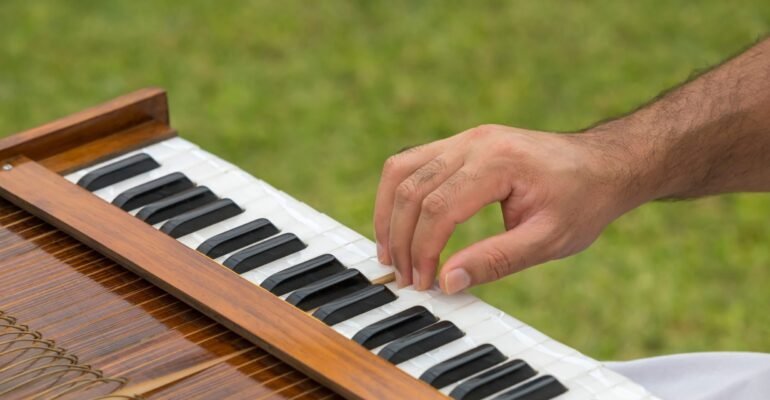The Role of Voice Culture in Indian Classical Music
December 27, 2023 2024-06-19 9:58The Role of Voice Culture in Indian Classical Music

The Role of Voice Culture in Indian Classical Music
The Role of Voice Culture in Indian Classical Music
Introduction:
Embark on a profound exploration of Voice culture in Indian classical music, a pivotal aspect that defines the essence of this timeless art form. In this blog post, we unravel the techniques, exercises, and significance of voice culture, shedding light on its indispensable role in the world of Indian classical singing.
Overview
1. Understanding Voice Culture in Indian Classical Music
- Importance of voice modulation
- Significance of pitch control
- Role of breath control in classical singing.
2. Techniques for Effective
- Sargam practice
- Alankar exercises
- Gamak and Meend techniques
3. Maintaining Vocal Health
- Hydration and nutrition
- Warm-up routines
- Rest and recovery
4. Impact of Voice Culture in Indian Classical Music on Expressiveness
- Conveying emotions through the voice
- Connecting with the audience
- Achieving melodic precision
5. Practical Tips for Implementing
- Consistent practice schedules
- Seeking guidance from experienced tutors
- Recording and self-analysis
Mastering Voice Culture in Indian Classical Music: Essential for Singers
1. Understanding Voice Culture in Indian Classical Music
Voice culture in Indian classical music is a journey into the heart of melodic expression, encompassing the delicate art of voice modulation, pitch control, and breath management. Each element plays a crucial role in shaping the profound and emotive experience that classical music aims to convey.
Importance of Voice Modulation
Mastering the nuances of voice modulation is at the core of voice culture in Indian classical music. It is the art of infusing each note with the intended emotion, creating a tapestry of expressive melodies that resonate with the soul.
Significance of Pitch Control
Pitch control is not merely a technicality; it is a cornerstone in preserving the purity of classical music. In the realm of voice culture, achieving pitch perfection ensures a harmonious rendition that captivates the listener.
Role of Breath Control in Classical Singing
The foundation of a powerful classical singing voice lies in adept breath control. Explore exercises and practices dedicated to enhancing breath control, empowering singers to deliver sustained and controlled musical phrases.
2. Techniques for Effective Voice Culture in Indian Classical Music
In this section, we delve into practical techniques that aspiring classical singers can incorporate into their daily practice to refine their voice culture in Indian classical music.
Sargam Practice
Sargam, the musical solfège, takes center stage in voice culture. Dive into structured sargam exercises designed to enhance vocal agility, accuracy, and overall proficiency in classical singing.
Alankar Exercises
The intricate art of alankars, or decorative patterns, contributes to the richness of voice culture. Learn how to integrate alankar exercises into your practice sessions, adding embellishments to your singing style.
Gamak and Meend Techniques
Voice culture in Indian classical music embraces ornamentation techniques like Gamak and Meend. Uncover the secrets behind these embellishments, understanding how they elevate the beauty and expressiveness of classical singing.
3. Maintaining Vocal Health for Voice Culture in Indian Classical Music
Ensuring vocal health is paramount for those immersed in voice culture. Explore practical tips and routines that safeguard the well-being of your vocal cords.
Hydration and Nutrition
Hydration and nutrition are the unsung heroes of voice culture in Indian classical music. Uncover the impact of proper hydration and nutrition on your voice, adopting practices that contribute to optimal vocal performance.
Warm-up Routines
Effective warm-up routines are essential rituals before engaging in rigorous voice culture in Indian classical music practice. Discover warm-up exercises tailored to prepare your vocal cords for the demands of classical singing.
Rest and Recovery
Balancing practice with ample rest and recovery is crucial in the world of voice culture in Indian classical music. Learn to strike a harmonious equilibrium to prevent vocal fatigue and ensure a resilient singing voice.
4. Impact of Voice Culture in Indian Classical Music on Expressiveness
This section explores how honing voice culture in Indian classical music directly influences the expressiveness of a singer, connecting deeply with the audience and achieving melodic precision.
Conveying Emotions Through the Voice
Unravel the intricacies of conveying emotions through your singing voice in voice culture. Learn how to imbue each note with the intended emotional depth, creating a profound impact on your audience.
Connecting with the Audience
Voice culture in Indian classical music extends beyond technicalities; it forges a direct connection with the audience. Discover techniques to engage your audience through expressive and well-modulated singing.
Achieving Melodic Precision
The pursuit of voice culture in Indian classical music leads to impeccable melodic execution. Explore how refined voice culture skills contribute to achieving melodic precision, marking a singer’s mastery of the classical art form.
5. Practical Tips for Implementing Voice Culture in Indian Classical Music
In this concluding section, we offer practical tips for seamlessly integrating voice culture into your daily practice routine.
Consistent Practice Schedules
Consistency is the bedrock of voice culture in Indian classical music. Establish and adhere to a regular practice schedule tailored to your needs, fostering steady improvement in your vocal skills.
Seeking Guidance from Experienced Tutors
Enlist the support of experienced classical singing tutors to guide you in your voice culture in Indian classical music journey. Benefit from personalized feedback and insights to refine your techniques.
Recording and Self-Analysis
Recording your practice sessions is a valuable tool in voice culture. Learn how to use recordings for constructive self-analysis, identifying areas for improvement and tracking your progress.
Conclusion
Mastering voice culture is an indispensable aspect of excelling in this art form. With dedication, practice, and expert guidance, elevate your vocal skills and create soul-stirring renditions. Explore the classical singing courses at Angel’s Music Academy in Jaipur for a transformative musical journey into the heart of voice culture in Indian classical music.
Related Posts
Women in Music
Music Technology
Techniques for Opera Singers
Different Roles in Opera
Search
Categories





